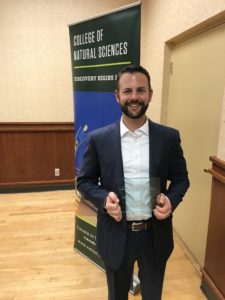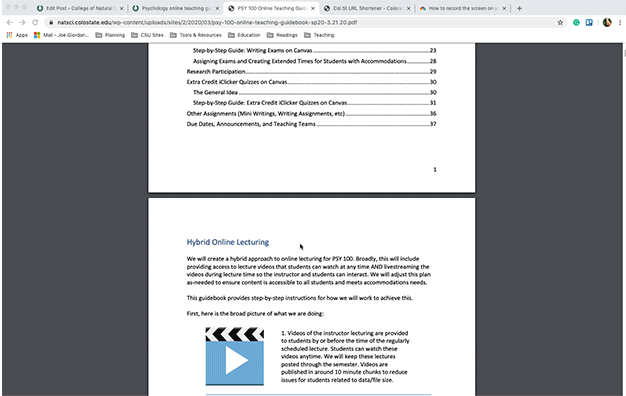
Psychology graduate student Ryan Rahm-Knigge has developed an online teaching guide that the College of Natural Sciences is now distributing as a general resource.
When Colorado State University announced all courses would move online after Spring Break, psychology graduate student Ryan Rahm-Knigge wanted to do all he could to help students and instructors make the transition successful.
Drawing on his three years as a Department of Psychology Teaching Fellow and leaning on a network of mentors and fellow instructors, Rahm-Knigge created a detailed online course guide for Psychology 100: General Psychology, one of the department’s largest undergraduate courses. The response to the guide has been so positive that College of Natural Sciences leadership is distributing it as a general resource, beyond psychology, for others to use as they transition to an online environment. The course guide is just one example of how a community has come together in a crisis to share available resources and help others.

“Honestly, the reaction to it has been surprising to me,” said Rahm-Knigge, a fifth-year counseling psychology Ph.D. student who won the college’s 2019 Graduate Student Excellence in Teaching and Mentoring Award. “I’ve enjoyed connecting with faculty from other departments who reached out to tell me how they’ve found it helpful, or to troubleshoot specific issues and questions.”
College of Natural Sciences Associate Dean for Academics Simon Tavener said the document was first shared by psychology department chair Don Rojas with college leadership, and it is now distributed on the college’s central resource page for remote instruction assistance. “I recognized the name since Ryan won our CNS graduate teaching award this year,” Tavener said. “This award is always one of my favorites, as year after year, so many of our graduate teaching assistants are spectacular.”
Shortly before Spring Break, as all of campus was busy with pandemic-related preparations, Rahm-Knigge consulted with other instructors and department computer coordinator Donna Merwath, who has been helping transition courses online, to develop a plan. The result was the guidebook, which includes step-by-step guides for recording in PowerPoint, uploading videos, and screenshots for easy reference. He also created a second guidebook for Psychology 292C, a smaller seminar course.
“I see Ryan’s guide as a high-quality extension of, and complement to, CSU’s Keep Teaching effort,” said Gwen Gorzelsky, executive director of the Institute for Learning and Teaching.
Jennifer Nyborg, a professor in the Department of Biochemistry and Molecular Biology, is one faculty member – now teaching three classes online – who has found Rahm-Knigge’s help invaluable.
“I am incredibly impressed with Ryan’s guide,” Nyborg said. “My life is so much easier, and my stress levels have gone down immeasurably. I owe much to Ryan and the amazing effort he has put forth to create a simple and elegant, go-to guide for this difficult transition. It is particularly impressive that Ryan created such a clean, easy to read, comprehensive guidebook while also serving as a graduate teaching assistant and graduate research assistant in psychology.”
“I am incredibly impressed with Ryan’s guide. My life is so much easier, and my stress levels have gone down immeasurably.”
— Jennifer Nyborg, professor in the Department of Biochemistry and Molecular Biology
Rahm-Knigge credited others in the department for their commitment to making online learning a success, particularly Karla Gingerich, psychology associate professor and Teaching Fellow coordinator.
“Dr. Gingerich has done a lot of work for several years mentoring the Teaching Fellows to provide a high-quality experience for both Psychology 100 students and us Teaching Fellows,” he said. “With her mentorship, Teaching Fellows provide excellent classroom learning for students and a basic consistent structure across sections. We also have individual freedom to tailor the course to our skills, personalities, and interests. In that way, Dr. Gingerich is our real course guide.”
Rahm-Knigge studies health outcomes related to sexual behavior and, in his career, aims to promote health for people living with HIV. He conducts this research with Brad Conner, associate professor in psychology. Once he finishes his final year of training on campus, Rahm-Knigge will begin an internship at Brown University’s Alpert Medical School.
Rahm-Knigge misses seeing friends, colleagues and students every day as the online semester starts, and like everyone, is busy problem-solving and building new habits for delivering quality work online.
“As I continue working with other instructors, part of our weekly meetings will be dedicated to talking about how we’re taking care of ourselves and each other,” he said.
